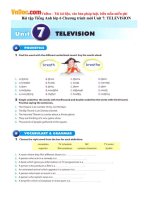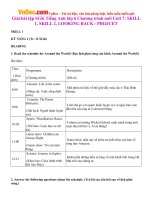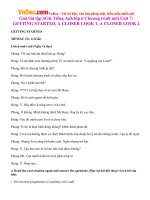Giáo án Tiếng Anh lớp 6 Chương trình mới Unit 7: Television
Bạn đang xem bản rút gọn của tài liệu. Xem và tải ngay bản đầy đủ của tài liệu tại đây (605.77 KB, 11 trang )
VnDoc - Tải tài liệu, văn bản pháp luật, biểu mẫu miễn phí
GIÁO ÁN MÔN TIẾNG ANH LỚP 6
(Chương trình thí điểm)
Period: 55
UNIT 7: TELEVISION
LESSON 1: GETTING STARTED
The objectives of the lesson
- At the end of the lesson, students can:
use some lexical items related to television
listen and read the conversation about television programme
ask and answer questions about TV
talk about likes and dislikes about TV
II. Procedures
1. Warm up: Elicit knowledge from students: Name TV prorammes you like
news
game show
television
programme
cartoon
film
2. Vocabulary
channel (n) (translation)
TV schedule (n) (picture)
comedy (n) (picture)
educational (adj) (elicit from students)
entertaining (adj) (translation)
3. Practice
3. 1. Activity 1: Listen and read
Comprehension questions
- Let students listen to the recording
local
television
VnDoc - Tải tài liệu, văn bản pháp luật, biểu mẫu miễn phí
- Organize pair work and let Ss practice
- Call on some Ss to give answers
Key: 1. Laughing out Loud 2. VTV3 3. No, they aren’t 4. Because he is awful
5. Tom is stupid but funny
Exercise b (page 7)
- Call on some students to give answers
- Give feedback and check
Key: - Mr Bean: funny, awful
- Tom: stupid, funny
- Jerry: intelligent
Exercise c (page 7)
- Elicit some adjectives from Ss
- Let Ss discuss in groups of 4
- Give feedback and check
Yes
- popular, historical, serious, long, educational,
boring, funny, good, entertaining, live
No
- beautiful, small
3. 2. Activity 2 & 3: Vocabulary
* Exercise d (page 7):
- Let Ss discuss in pairs
- Give feedback and check
Key: 1. national television 2. news programme 3. local television
4. comedy
5. game show
6. animal programme
* Exercise e (page 7)
- Let them work in groups of 4
- Call on some students to give answers
- Give feedback and check
Key: 1. national 2. comedy 3. channels 4. competition 5. Cartoons 6. educational
4. Free practice
- Give instruction: Talk about likes and dislikes about TV (page 7)
- Let Ss discuss in groups of 4
- Call on some students to report
- Give feedback
5. Homework - Learn the lesson & Prepare the next lesson: Unit 7 – A closer look 1
VnDoc - Tải tài liệu, văn bản pháp luật, biểu mẫu miễn phí
Period: 56
LESSON 2: A CLOSER LOOK 1
The objectives of the lesson
- At the end of the lesson, students can:
use some lexical items related to television
pronounce correctly two sounds: /θ/, /ð/
II. Procedures
1. Warm up: Word Puzzle
r
e
m
o
t
e
c
o
n
t
r
o
l
2. Pre- teach vocabulary
- MC (n) (pictures)
- viewer (n)(picture)
- weatherman (n)(situation)
- newsreader (n) (situation)
- remote control (n) (picture)
3. Practice
3. 1. Vocabulary
* Exercise 2 (page 8)
- Let students do the task in pairs
- Call on some students to give answers
- Give feedback and check
Key: 1. weatherman 2. newsreader 3. remote control 4. MC 5. volume button 6. TV viewer
* Exercise 3: Game: Who ?/ What ?
+ Each group reads 2 definitions and other group guess who he/ she is or what it is.
+ Example: A: A person who reads out the reports on a television.
B: He is newsreader.
3. 2. Pronunciation
* Exercise 4 (page 8)
- Pronounce two sounds /θ/, /ð/
- Call on some students practice
- Give feedback
* Exercise 5 (page 8)
- Let them listen to the recording and check
Key: /θ/: theatre, thanksgiving, earth, anything, both, through
/ð/: there, them, neither, weatherman, than, feather
VnDoc - Tải tài liệu, văn bản pháp luật, biểu mẫu miễn phí
* Exercise 6 (page 8) : Tongue Twister
- Organize teams
- Let representative of each team practice
- Give feedback
4. Homework
- Learn the lesson
- Do exercises of part A and exercises 1, 2, 3 of part B on pages 4 & 5 in the workbook
Period: 57
LESSON 3: A CLOSER LOOK 2
The objectives of the lesson
- At the end of the lesson, students can:
use wh-questions
use conjunctions to connect words and ideas
II. Procedures
1. Warm up: Chatting using wh-questions
2. Presentation
2. 1. Wh-questions
* Exercise 1 (page 9)
- Ask students to read the dialogue
- Elicit knowledge from students and introduce grammar box (page 9)
2. 2. Conjunctions: But, and, so, because, although
- But / and: Connect words/ clauses
E. g: He is clever but lazy. / He is clever but he is lazy.
- So/ because/ although: Connect clauses
E. g: I am tired, so I am going to bed early.
He is late for school because he often gets up late.
Although it is rainy, she stills goes to school.
3. Practice
* Exercise 2 (page 9)
- Give instruction
- Let students fill in blanks with wh-words
- Call on some students for answers
- Let them listen and check
Key: 1. How often/ What 2. Who 3. When / Where
* Exercise 3 (page 10)
VnDoc - Tải tài liệu, văn bản pháp luật, biểu mẫu miễn phí
- Give instruction
- Ask students to work in pairs
- Call on some students for answers
- Give feedback and check
Key: What / What/ How many/ Why/ What time/ When /
- Call on some pairs to practice the dialogue for speaking practice
* Exercise 4 (page 10)
- Let students discuss in groups of 4
- Call on some representatives to write answers on board
- Give feedback and check
Key: 1. and 2. but 3. although 4. because 5. so
* Exercise 5 (page 10)
- Let students to work in pairs
- Call on some students to write answers on board
- Check: 1-c 2- a 3- e 4- b 5- d
* Exercise 6 (page 10)
- Let students work in group
- Call on some students to write answers on board
- Check: 1. What is the name of the national TV channel ?
2. How many hours does it broadcast / How long is it on ?
3. It depends on each student.
4. How much does cable TV cost per month ?
5. Who is your favourite TV person?
4. Homework
- Learn the lesson and do exercises 4,5,6,7 on pages 5 & 6 in the workbook
Period: 58
LESSON 4: CULTURE & COMMMUNICATION
The objectives of the lesson
- At the end of the lesson, students can:
know interesting facts about television
read to get information about favourite programme
talk about their favourite programme
II. Procedures
1. Warm up: Game: Guess the names of famous programmes in the world
VnDoc - Tải tài liệu, văn bản pháp luật, biểu mẫu miễn phí
2. Pre-teach vocabulary and structures
* Vocabulary
1. clumsy / ˈklʌmzi/ (adj) (explanation)
2. mini-series /ˈmɪnisɪəriːz / (n) (picture)
3. cute (v) (picture & example)
4. made in (P2) (example)
5. young audience (v) (translation)
3. Practice
Exercise 1:
- Let students work in groups of 4
6. character / ˈkærəktə(r)/ (n) (example)
7. special guest (n) (translation)
8. educate (v) (translation)
9. adventure /ədˈventʃə(r)/ (n) (picture)
10. entertain /ˌentəˈteɪn/ (v) (translation)
- Call on some representatives to give answers
- Give feedback and check
Key: 1. Japan 2. Viet Nam 3. Iceland 4. The USA 5. Finland 6. Britain
Exercise 2:
- Let them discuss in groups of 4
- Call on some students to give their opinions
- Give feedback
Exercise 3 a:
- Let students read the passages
- Ask them some questions for comprehension
1. How many TV programmes are there ?
2. What are they about ?
3. Why are those programmes famous ?
Exercise 3b:
- Let students reread the passages and tick the correct programme
- Ask them exchange answers with their partners
- Call on some students for answers
- Give feedback and check
Key: 1. both programmes
4. Let’s learn
2. Let’s learn
5. Hello Fatty !
3. Hello Fatty !
6. Let’s learn
Exercise 4: Free-speaking - Talk about your favourite programme and give reasons
- Let students reread the model passages
- Give example: I like programme “Hello Fatty!” because it educates young audiences.
4. Homework
- Learn the lesson
VnDoc - Tải tài liệu, văn bản pháp luật, biểu mẫu miễn phí
- Do homework: Part C – Unit 7 in the workbook (pages 6 & 7)
Period: 59
LESSON 5: SKILLS 1
The objectives of the lesson
- At the end of the lesson, students can:
read TV schedule to get information about TV programmes and its contents
talk about favourite programme
II. Procedures
1. Warm up: Chatting about TV schedule
2. Pre-reading
* Vocabulary
1. documentary (n) (translation)
2. instructor (n) (translation)
3. skating rink (n) (picture)
5. race (n) (picture)
6. jungle (n) (example)
7. planet (n) (picture)
8. system (n) (translation)
9. discover (v) (translation)
3. While reading
Exercise 1: Read TV schedule
* comprehension questions
1. How many programmes are there in TV schedule ?
2. In what programme can we know about planets ?
3. When can wee watch animal programme ?
Exercise 2:
- Give instruction
- Let students work individually
- Call on some students to give answers
Key: 1. Wheelbarrow Races
2. The Parrot Instructor
3. Yes, we can.
4. A documentary about the colourful living world in the Pacific
5. No, it isn’t.
Exercise 3: Game: Lucky number
- Let students work in pairs
- Call on some students for answers
- Give feedback and check
VnDoc - Tải tài liệu, văn bản pháp luật, biểu mẫu miễn
phí
1. Phong: Science: Journey to Jupiter
2. Bob: Comedy: The parrot Instructor
3. Nga: Game show: Children are Always Right
4. Minh: Sports: Wheelbarrow Races
5. Linh: Animals: Ocean Life
4. Post reading: Talk about favourite programmes
- Give instruction
- Give example
- Let students discuss in groups of 4
- Call on some students to practice speaking
- Give feedback
5. Homework
- Learn the lesson
- Do exercises in part D, Unit 7 in workbook
Period: 60
LESSON 6: SKILLS 2
The objectives of the lesson
- At the end of the lesson, students can:
listen to get information about programmes and channels
write about TV watching habit
II. Procedures
1. Warm up: Chatting
* Do you often watch TV ?
* How many hours do you spend on watching TV ?
* Do you watch TV when you eating or studying ?
2. Vocabulary
spotted squirrel (n)
lonely (adj)
giraffe (n)
discover (v)
choose (v)
offer (v)
VnDoc - Tải tài liệu, văn bản pháp luật, biểu mẫu miễn
phí
3. Practice
3. 1. Listening
Exercise 1:
- Ask them to guess
- Let them listen to the recording and check
- Call on some students to give answer
- Give feedback and check
Programme
Music: Green green Summer
Cartoon: The Read Spotted Squirrel
Channel 1
Channel 2
X
X
Film: The Lonely Giraffe
Home and Garden: How to make a Dog House
Our Heritage: The Old Town of Inca
Channel 3
X
X
X
* Exercise 2: True / False
- Let students read through the statements
- Ask them to guess: T / F
- Let them listen to the recording to check
- Call on some students to give answers and check: 1. F 2. T 3. F 4. T 5. F
3. 2. Writing
* Exercise 3: Survey about TV watching habit
- Let students work in pairs
- Call on some pairs to practice asking and answering
- Give feedback
* Exercise 4: Write a short paragraph about TV watching habit
- Give instruction: Use the questions and your answer in exercise 3 to write a short paragraph
about TV watching habit
- Provide the sample:
I often watch TV everyday. I spend only one hour watching TV. When I have free time, I often
stay at home to watch films. The time I spend watching TV is more than the time I spend on
outdoor activities. I don’t watch TV when I am eating. I like film programme most because it is
interesting. I turn off TV when I don’t watch it any more.
- Let students write
VnDoc - Tải tài liệu, văn bản pháp luật, biểu mẫu miễn
phí
- Collect some writings and give feedback
4. Homework
- Learn the lesson
- Prepare he next lesson: Unit 7 – Looking back and project
- Do homework: Part E – Writing – Unit 7 in the workbook
Period: 61
LESSON 7: LOOKING BACK & PROJECT
The objectives of the lesson
- At the end of the lesson, students can:
review lexical items and grammar
practice speaking about television programme
interview about the importance of TV
II. Procedures
1. Warm up: Chatting
2. Review
2. 1. Vocabulary
* Exercise 1: Group words
- Give instruction
- Divide the class into groups
- Let groups do the task
- Check
People
Programme
Kinds of film
Newsreader
Cartoon
Documentary
Weatherman
Game show
Romance
Writer
Animals
MC
Home and garden
* Exercise 2: Fill in the blanks with suitable provided words
- Give instruction
- Let students work individually
- Ask them to exchange their answers
- Check
1. national
2. viewers
3. 7 o’clock news
4. comedies
VnDoc - Tải tài liệu, văn bản pháp luật, biểu mẫu miễn
phí
5. relax
6. game shows
7. educational
8. writers
2. 2. Grammar
* Exercise 3: Fill in the blanks with “ wh-words”
- Give instruction
- Let students work individually
- Ask them to exchange their answers
- Check
1. How many
2. What
3. Why
4. Who
* Exercise 4: Combine the sentences using conjunction
5. When
- Give instruction
- Explain new words if necessary
- Ask students to do separately
- Go around to give help if necessary
2. 3. Communication
* Exercise 5: Arrange the sentences to make complete dialogue
- Give instruction
- Explain new words if necessary
- Let students work in pairs
- Go round to supervise
- Check : A – C – B – D – F – H – G – E – I – K
3. Project
- Give instruction: Use provided questions and answers to interview about “ How important is
TV to you”
- Ask students to interview their group members
- Ask them to take note their answers of their friends
- Ask some students to report their results
- Give feedback
4. Homework
- Learn the lesson
- Prepare the new lesson: Unit 8 – Getting started








